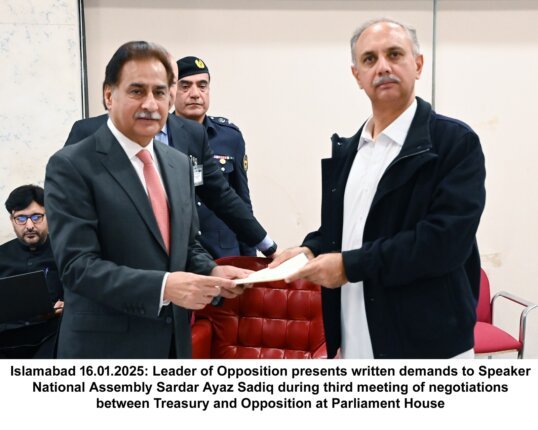ISLAMABAD: The Pakistan Tehreek-e-Insaf (PTI) formally presented its ‘charter of demands’ to the government in writing on Thursday during the third round of negotiations aimed at de-escalating political tensions.
Negotiations between the government and PTI began in late December; however, progress has been sluggish on key issues, including the formation of a judicial commission and the release of PTI-affiliated prisoners. Both sides have accused each other of derailing the talks and lacking seriousness in resolving the political deadlock.
A critical meeting between PTI’s negotiating team and party founder Imran Khan in Adiala Jail on January 12 set the stage for this latest round of discussions. However, recent exchanges in the National Assembly and Senate have reignited tensions, with government and opposition lawmakers trading barbs.
Details of the Meeting
The third round of negotiations took place under the supervision of National Assembly Speaker Sardar Ayaz Sadiq and was attended by six PTI representatives and eight government officials.
From the opposition, participants included Leader of the Opposition in the National Assembly Omar Ayub, Khyber Pakhtunkhwa Chief Minister Ali Amin Gandapur, PTI MNA Asad Qaiser, Sunni Ittehad Council chief Hamid Raza, Majlis Wahdat-i-Muslimeen chief Senator Raja Nasir Abbas Jafri, and PTI Secretary General Salman Akram Raja.
The government’s delegation comprised Deputy Prime Minister and Foreign Minister Ishaq Dar, PML-N Senator Irfan Siddiqui, PPP MNAs Raja Pervaiz Ashraf and Naveed Qamar, Prime Minister’s political aide Rana Sanaullah, and MQM-P MNA Dr. Farooq Sattar.
During the meeting, PTI formally submitted a three-page document outlining its demands, signed by all six opposition representatives present.
Key Demands
PTI outlined two primary demands:
- Formation of Two Judicial Commissions: The opposition called for the establishment of two independent commissions under the Commission of Inquiry Act, 2017. It proposed that these commissions be led either by the Chief Justice of Pakistan or by three serving Supreme Court judges mutually nominated by both sides within seven days. PTI emphasized that the commissions’ proceedings should be open to the public and media.
- Support for Political Prisoners: PTI sought government assistance in securing bail, sentence suspensions, and acquittals for party members and activists it identified as ‘political prisoners.’
PTI underscored that these measures were prerequisites for broader negotiations on constitutional restoration, rule of law, and ensuring free and fair elections. The party also warned that talks would not continue unless these commissions were agreed upon and formed immediately.
Commission on May 9 Riots
The first commission would investigate the events surrounding Imran Khan’s arrest on May 9, 2023. PTI demanded an inquiry into:
- The legality of Imran Khan’s arrest and the role of law enforcement in breaking into the Islamabad High Court.
- The sequence of violent protests across the country following his arrest.
- How individuals reached high-security locations and caused damage to public property.
- The availability and possible tampering of CCTV footage at these sites.
- Allegations of human rights violations, including torture, unlawful arrests, and sequential FIRs against PTI members.
- Media censorship and government-imposed internet shutdowns before, during, and after the unrest.
Commission on November 26 Crackdown
The second commission would investigate events from November 24 to 27, when PTI staged its ‘Final Call’ protest in Islamabad. PTI raised concerns over:
- The alleged use of live ammunition and excessive force against protestors.
- The number of casualties, injuries, and missing persons during the crackdown.
- Possible tampering of hospital records and obstruction of information about fatalities.
- The availability and authenticity of CCTV footage from protest sites.
- Legal hurdles faced by those attempting to file FIRs against state actions.
- Restrictions on media coverage and internet shutdowns imposed during the protests.
Government’s Response
Speaker Sadiq acknowledged that discussions were moving in the “right direction.” However, the government has yet to make a formal commitment to PTI’s demands.
With the political climate still tense, the success of the ongoing dialogue remains uncertain. PTI maintains that unless its conditions are met, further negotiations may be at risk.




